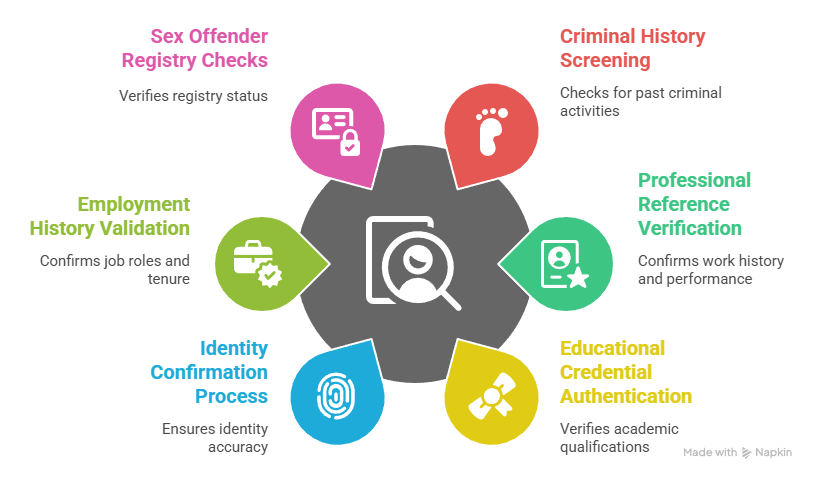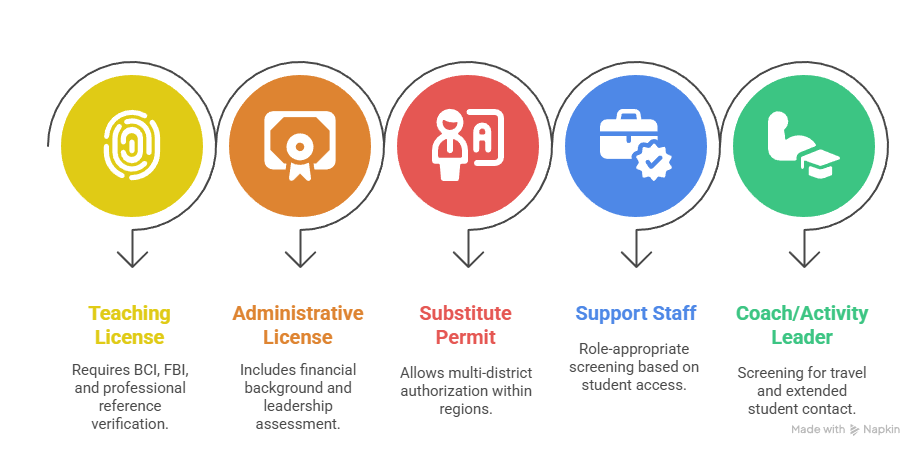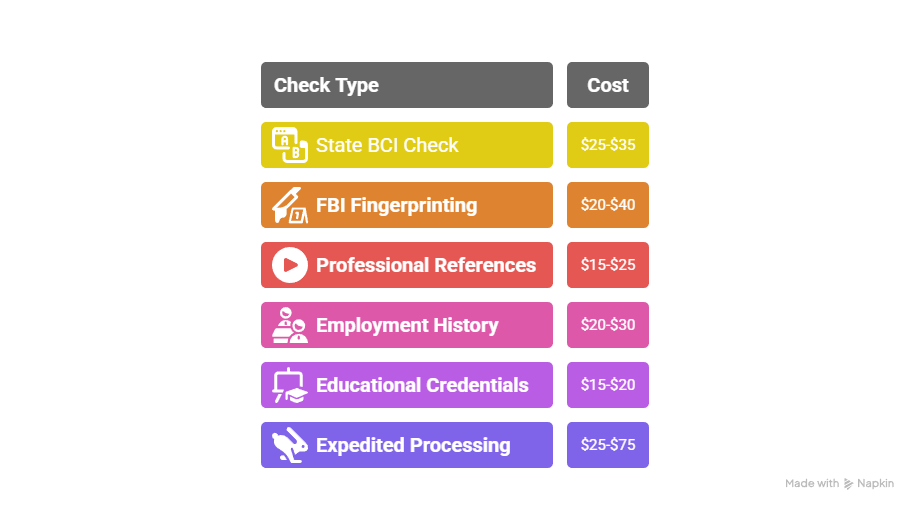Ohio education background checks are mandatory screening requirements that include state Bureau of Criminal Investigation (BCI) checks, FBI fingerprinting, and specialized educator screenings to ensure student safety and regulatory compliance. These comprehensive background verification processes are essential for all school personnel, from teachers to support staff, and must meet strict timelines and documentation standards established by the Ohio Department of Education.
Key Takeaways
- Ohio requires both state BCI and federal FBI background checks for all education personnel, with results valid for specific timeframes before renewal
- Teaching license background checks in Ohio must be completed before employment and include criminal history, sex offender registry searches, and professional reference verification
- School districts have 30 days to complete the Ohio teacher background screening process once conditional employment offers are made
- Background check costs typically range from $50-$150 per applicant, with some districts covering expenses while others require employee payment
- Certain criminal convictions automatically disqualify candidates from education positions, while others may be evaluated on a case-by-case basis
- Professional licensing boards maintain ongoing monitoring systems that can trigger additional background reviews during employment
Understanding Ohio's Education Background Check Requirements
Ohio's education sector operates under strict background screening protocols. The Ohio Department of Education mandates comprehensive vetting processes that go beyond basic criminal history checks. These requirements ensure individuals working with children meet the highest safety standards. They also maintain compliance with federal regulations.
The screening process includes multiple verification layers. These layers cover identity confirmation, employment history validation, and educational credential verification. School districts must navigate complex regulatory frameworks. These frameworks involve coordination between state agencies, federal databases, and professional licensing boards. Understanding these requirements is crucial for job seekers entering the education field. HR professionals managing hiring processes also need this knowledge.
Types of Background Checks Required in Ohio Schools
School employee background verification includes multiple screening components. Criminal history searches form the foundation of the process. Professional reference checks add crucial context about work performance and qualifications. Educational institutions must coordinate these various elements to ensure complete evaluation before making hiring decisions.

- Criminal history screening
- Professional reference verification
- Educational credential authentication
- Identity confirmation process
- Employment history validation
- Sex offender registry checks
The verification process examines identity through government-issued identification. Employment history validation spans the previous seven years. Educational credential authentication comes from accredited institutions only.
Criminal History Screening
Ohio BCI background check education requirements examine all criminal records within the state's jurisdiction. This includes arrests, convictions, dismissed charges, and sealed records that may be accessible to educational employers. The Bureau of Criminal Investigation maintains comprehensive databases. These databases are updated continuously with new information from local, county, and state law enforcement agencies.
Federal screening complements state checks by providing national perspective on criminal activity. FBI fingerprint checks search all 50 states for criminal history. These dual-layer searches ensure comprehensive coverage. They examine all jurisdictions where candidates may have lived or worked.
Professional Reference Verification
School district hiring process Ohio standards require systematic contact with previous employers. Districts must verify job performance, attendance records, and reasons for separation. References must include direct supervisors who can speak to classroom management skills. They must also address student interaction quality and professional conduct.
| Reference Type | Required Number | Contact Method |
| Direct Supervisors | 2 minimum | Phone interview |
| Professional Colleagues | 1-2 preferred | Written verification |
| Educational Leaders | 1 required | Formal evaluation |
Employment history verification extends beyond reference conversations. It includes confirmation of dates of employment, salary history, and eligibility for rehire status. This process helps identify any gaps in employment that may require additional explanation.
Ohio BCI and FBI Fingerprinting Process
Fingerprinting appointments must be scheduled at authorized locations throughout Ohio. Candidates bring two forms of government-issued identification and exact payment for processing fees. Digital scanning technology captures high-resolution prints. These prints are transmitted simultaneously to state BCI systems and federal FBI databases. Processing begins immediately upon successful submission. Initial screening results are typically available within 24-48 hours for candidates with no criminal history.
Fingerprinting Locations and Scheduling
Ohio maintains numerous authorized fingerprinting locations across the state. These include dedicated service centers and approved third-party vendors. Many locations offer online scheduling systems. These systems allow candidates to book appointments at their convenience. Weekend and evening hours are available at select locations. This accommodates working professionals.
Mobile fingerprinting services are available for large-scale hiring events. They also serve districts in remote areas. These services bring certified technicians and equipment directly to school facilities. This streamlines the process for multiple candidates simultaneously.
Processing Timelines and Results
State BCI checks typically process within 2-3 business days. FBI results may take 1-2 weeks depending on the complexity of an individual's background. Rush processing options are available for urgent hiring situations. Additional fees apply for expedited services.
Results are transmitted directly to authorized school district personnel through secure channels. Candidates cannot access their own results directly. This ensures hiring decisions are based on complete, unfiltered information. Districts must maintain strict confidentiality protocols when handling background check results.
Teaching License Background Check Requirements
Teaching license background checks in Ohio involve coordination between multiple agencies. The Ohio Department of Education maintains centralized databases. These databases track all licensed personnel background check status and renewal requirements. Licensed educators undergo initial screening during certification application. They face ongoing monitoring throughout their careers.
Different educator roles carry specific screening requirements. These requirements are based on student interaction levels and administrative responsibilities. License renewals trigger updated background screenings to ensure continued eligibility. The state monitoring system automatically flags license holders who are arrested or charged with crimes.

- Professional Teaching License: Complete BCI, FBI, and professional reference verification required
- Administrative License: Enhanced screening including financial background and leadership assessment conducted
- Substitute Teacher Permit: Streamlined process allowing multi-district authorization within regions
- Support Staff Clearance: Role-appropriate screening based on student access and responsibility level assigned
- Coach/Activity Leader: Additional screening for positions involving travel and extended student contact situations
The licensing system maintains ongoing monitoring of all certified personnel. This monitoring can trigger immediate review processes when new issues arise.
Professional Educator License Screening
Professional teaching licenses require the most comprehensive background evaluation. This includes criminal history, professional conduct review, and educational credential verification. Applicants must provide detailed employment history covering the previous ten years. Particular attention is paid to any positions involving work with minors.
Reference verification for professional licenses must include evaluations from direct supervisors and colleagues. When possible, it should include parents or community members who can attest to professional conduct. These references are contacted directly by licensing officials to ensure authenticity. They gather detailed information about candidate suitability.
School Employee Background Verification Timelines
Ohio regulations establish specific timelines that school districts must follow. Conditional employment offers trigger a 30-day window. During this period, all required checks must be completed and cleared. Extensions may be granted in cases where delays are beyond the district's control.
The verification timeline includes multiple checkpoints that HR departments must track carefully. Initial application review takes 3-5 business days for preliminary screening. Reference verification requires 5-10 business days depending on responsiveness. Criminal background processing takes 7-14 business days for complete searches.
| Verification Stage | Timeline | Requirements |
| Initial Application Review | 3-5 days | Document verification |
| Reference Verification | 5-10 days | Contact previous employers |
| Criminal Background Processing | 7-14 days | State and federal searches |
Final clearance authorization requires 2-3 business days for administrative review and employment authorization. New hire orientation must occur within 30 days of final clearance approval. Districts that fail to meet these timelines may face regulatory penalties.
Expedited Processing Options
Emergency hiring situations may qualify for expedited background check processing. This uses Ohio's priority review system. Districts must demonstrate immediate staffing needs. They must provide documentation supporting the urgent request. Additional fees apply for expedited services. These typically range from $25-$75 above standard processing costs.
Substitute teachers and temporary personnel may work under provisional clearances while background checks are pending. They must maintain direct supervision by fully cleared staff members. These provisional arrangements cannot exceed 30 days. They require daily documentation of supervisory activities.
Disqualifying Factors and Appeal Processes
Ohio maintains strict standards regarding criminal convictions. Some convictions automatically disqualify candidates from education positions. Violent crimes, sexual offenses, drug trafficking, and crimes against children result in permanent disqualification. These have no appeal rights. Lesser offenses may be evaluated based on factors such as time elapsed, rehabilitation efforts, and relevance to educational responsibilities.
The appeal process allows candidates to challenge background check results. They can request reconsideration of disqualifying factors. Appeals must be filed within 30 days of receiving adverse decisions. They must include supporting documentation such as court records, character references, and evidence of rehabilitation.
Automatic disqualifiers include violent felonies such as murder, assault, robbery, and domestic violence convictions. Sexual offenses require sex offender registration or involve minors. Drug crimes include trafficking, distribution, or manufacturing controlled substances. Child abuse covers physical, sexual, or emotional abuse of minors in any jurisdiction. Financial crimes involve embezzlement, fraud, or theft involving educational institutions.
Administrative law judges review appeals through formal hearings. These hearings allow candidates to present evidence and testimony supporting their fitness. The review process examines the totality of circumstances. This includes the nature of offenses, time elapsed, rehabilitation efforts, and potential risk to students. Final decisions can be appealed to state courts under limited circumstances.
Costs and Payment Responsibilities
Background check expenses in Ohio education vary significantly. This depends on the comprehensiveness of screening required and urgency of processing needed. Standard fingerprint-based criminal history checks through BCI and FBI databases typically cost $50-$75 combined. Enhanced screenings for administrative positions can reach $150-$200.
Payment responsibility policies differ substantially across Ohio school districts. Some absorb all screening costs as recruiting expenses. Others require candidates to pay upfront with potential reimbursement after successful completion of probationary periods. Urban districts tend to cover background check costs to attract qualified candidates. Smaller rural districts often require candidate payment due to budget constraints.

Financial assistance options include payment plans that allow costs to be deducted from initial paychecks. Some districts offer fee waivers for economically disadvantaged candidates in high-need subject areas. Hard-to-staff positions such as special education, mathematics, or science teaching roles may qualify for assistance.
District-Specific Cost Policies
Large urban districts typically establish comprehensive cost coverage policies. These policies include all required background screening components as part of competitive recruitment strategies. These districts view background check costs as necessary investments in attracting qualified candidates. Payment is usually handled directly between districts and screening vendors. This eliminates upfront costs for candidates.
Rural and smaller districts more commonly require candidates to pay screening costs upfront. Reimbursement policies vary based on local board decisions and budget availability. Some offer partial reimbursement after successful completion of the first year of employment. Others provide full reimbursement upon tenure achievement.
Maintaining Ongoing Compliance
Ohio's education background check system includes sophisticated monitoring capabilities. These track licensed personnel for new criminal activity throughout their careers. School employees must report any arrests, charges, or convictions to their administrators within 48 hours. This applies regardless of the severity or nature of the alleged offense. Failure to report criminal activity can result in immediate termination. It can also lead to potential criminal charges for providing false information to employers.
Annual compliance audits help districts maintain accurate records. They identify staff members whose background clearances may be approaching expiration dates. These systematic reviews include verification of professional license renewals. They check background check validity periods and documentation of any reported incidents requiring follow-up investigation.
Professional development requirements often include mandatory training. This training covers recognizing warning signs of inappropriate behavior. It includes proper reporting procedures for suspected misconduct. It also covers understanding legal obligations for maintaining safe learning environments. All school personnel must complete this training annually. They must demonstrate understanding of their responsibilities for protecting student welfare.
Ongoing Monitoring Systems
The state monitoring system automatically tracks all certified personnel. It flags individuals who are arrested or charged with crimes anywhere in the United States. This system triggers immediate review processes when new criminal activity occurs. Districts receive automatic notifications when their employees are involved in legal issues.
Monitoring extends beyond criminal activity to include professional conduct issues. This covers license suspensions in other states, professional disciplinary actions, and civil court proceedings. The comprehensive monitoring ensures that any issues affecting educator fitness are identified quickly.
Special Considerations for Different Education Roles
Different education positions throughout Ohio require varying levels of background screening intensity. This is based on student interaction frequency, access to confidential information, and supervisory responsibilities. Classroom teachers undergo the most rigorous evaluation process. Administrative positions require additional financial background screening due to budget oversight responsibilities.
Support staff positions receive role-appropriate screening that focuses on relevant risk factors. Bus drivers must complete specialized screening that includes motor vehicle record review. Technology staff undergo enhanced screening for positions involving student data systems. Volunteer screening requirements depend on the nature and extent of student interaction.
- Classroom Teachers: Comprehensive criminal history review, extensive professional reference verification, and detailed examination of educational credentials
- School Administrators: Additional financial background screening, credit checks, and examination of bankruptcy filings or civil judgments
- Bus Drivers: Department of Transportation background screening, driving record examination, and commercial license verification
- Food Service Personnel: Health department clearances, food safety training verification, and communicable disease screening
- Technology Staff: Enhanced screening for student data access, network security responsibilities, and confidential information handling
- Custodial Workers: Standard criminal background checks with focus on facility access and student safety considerations
Contractor and vendor screening requirements depend on facility access levels and student interaction potential. Regular classroom volunteers receive more comprehensive evaluation than occasional event helpers.
Administrative Position Enhancements
School administrators face enhanced background screening requirements. These include financial history review, credit checks, and examination of bankruptcy filings. These additional screenings help identify potential risks for fraud, embezzlement, or financial mismanagement. Professional reference verification for administrative candidates must include evaluations from school board members and community leaders.
Leadership assessment components evaluate decision-making skills and crisis management experience. They assess the ability to handle confidential information appropriately. Background investigators may conduct interviews with community members, parents, and staff from previous positions.
Specialized Support Staff Requirements
Bus drivers working for Ohio schools must complete Department of Transportation background screening. This is in addition to standard education requirements. It includes examination of driving records for the previous ten years. Commercial driver's license verification ensures current certification. Physical examination clearances confirm ability to safely operate large vehicles.
Food service personnel require health department clearances. These verify food safety training completion and screen for communicable diseases. Athletic coaches need additional screening for positions involving overnight travel. They also need screening for positions with physical contact and after-hours supervision responsibilities.
Compliance Best Practices for School Districts
School districts must establish comprehensive policies and procedures for managing background check requirements. These policies should clearly define roles and responsibilities for HR staff, administrators, and hiring managers. Regular training ensures all personnel understand current requirements and proper procedures. Documentation standards help maintain compliance and support audit activities.
Quality assurance processes help identify potential issues before they become compliance problems. Regular reviews of background check files ensure completeness and accuracy. Tracking systems monitor renewal dates and trigger timely processing of updated screenings. Communication protocols ensure all stakeholders receive necessary information promptly.
| Best Practice Area | Key Components | Implementation Timeline |
| Policy Development | Written procedures, role definitions | 30-60 days |
| Staff Training | Initial and ongoing education | Quarterly updates |
| Documentation Standards | File management, record retention | Immediate implementation |
Technology solutions can streamline background check processes and improve accuracy. Automated tracking systems reduce manual errors and ensure timely renewals. Electronic communication with screening vendors speeds processing and reduces delays. Digital record keeping improves organization and supports compliance audits.
Record Retention Requirements
Ohio law requires specific record retention periods for background check documentation. Criminal history records must be maintained for the duration of employment plus seven years. Professional reference documentation should be kept for five years after separation. Appeal records and related documentation require ten-year retention periods.
Secure storage systems protect confidential background check information from unauthorized access. Access controls ensure only authorized personnel can view sensitive records. Regular audits verify compliance with retention requirements and identify records eligible for destruction.
Future Trends in Ohio Education Background Screening
Technology continues to evolve and improve background screening processes. Artificial intelligence helps identify patterns and potential risks more effectively. Blockchain technology may provide secure, tamper-proof record keeping. Mobile applications could streamline fingerprinting and data collection processes.
Legislative changes may expand or modify current background check requirements. Federal laws affecting education screening continue to develop. Professional organizations advocate for standardized processes across state lines. Interstate compacts may facilitate teacher mobility while maintaining safety standards.
Continuous monitoring systems are becoming more sophisticated and comprehensive. Real-time alerts provide immediate notification of new criminal activity. Predictive analytics may help identify potential risks before incidents occur. Integration with professional licensing systems improves coordination and reduces duplication.
The emphasis on student safety will likely drive additional screening requirements. Social media background checks may become standard practice. Mental health screening could become part of the evaluation process. International background checks may be required for educators with overseas experience.
Conclusion
Ohio education background checks represent a comprehensive system designed to protect students while enabling qualified professionals to pursue rewarding careers in education. The multi-layered screening process combines state and federal criminal databases, professional reference verification, and ongoing monitoring to create robust safety measures. Success in navigating these requirements depends on understanding specific obligations, maintaining proper documentation, and seeking professional guidance when complex situations arise. Both school districts and job seekers benefit from staying informed about evolving regulations and implementing best practices that ensure compliance while promoting effective hiring processes.
Frequently Asked Questions
How long are Ohio education background checks valid?
Ohio education background checks are typically valid for 5 years for licensed personnel and 3 years for substitute teachers and support staff. However, ongoing monitoring systems can trigger additional reviews if new criminal activity occurs during the validity period.
Can I work in Ohio schools while my background check is pending?
Limited provisional employment may be permitted for substitute teachers and emergency hires under direct supervision, but this cannot exceed 30 days. Most positions require complete background check clearance before beginning work with students.
What happens if I have a criminal conviction on my record?
The impact depends on the nature and timing of the conviction. Violent crimes, sexual offenses, and crimes against children typically result in automatic disqualification. Lesser offenses may be evaluated individually based on rehabilitation efforts and relevance to education responsibilities.
Do I need separate background checks for each Ohio school district?
Generally, yes. While some screening components may transfer between districts, most require district-specific background checks due to varying policies and insurance requirements. Some regional cooperatives allow shared screening for substitute teachers.
How much do Ohio education background checks cost?
Total costs typically range from $50-$150, depending on the comprehensiveness of screening required. Some districts pay these costs, while others require candidates to pay upfront. Payment plans and fee waivers may be available in certain circumstances.
Can I appeal a negative background check decision?
Yes, Ohio provides appeal processes for adverse background check decisions. Appeals must be filed within 30 days and include supporting documentation. Legal representation is recommended for complex cases involving criminal history evaluation.
Additional Resources
- Ohio Department of Education - Background Check Requirements
https://education.ohio.gov/Topics/Teaching/Educator-Background-Checks - Ohio Bureau of Criminal Investigation Services
https://www.ohioattorneygeneral.gov/Business/Services-for-Business/BCI - FBI - Background Check Information and Processing
https://www.fbi.gov/services/cjis/identity-history-summary-checks - Ohio Revised Code - School Personnel Background Check Compliance Guide
https://codes.ohio.gov/ohio-revised-code/section-3319.39 - NAACP Legal Defense Fund - Employment Rights
https://www.naacpldf.org/criminal-justice/employment/ - Ohio Education Association - Professional Standards and Legal Support
https://www.ohea.org/professional-excellence/professional-standards

GCheck Editorial Team
Meet the GCheck Editorial Team, your trusted source for insightful and up-to-date information in the world of employment background checks. Committed to delivering the latest trends, best practices, and industry insights, our team is dedicated to keeping you informed.
With a passion for ensuring accuracy, compliance, and efficiency in background screening, we are your go-to experts in the field. Stay tuned for our comprehensive articles, guides, and analysis, designed to empower businesses and individuals with the knowledge they need to make informed decisions.
At GCheck, we're here to guide you through the complexities of background checks, every step of the way.





